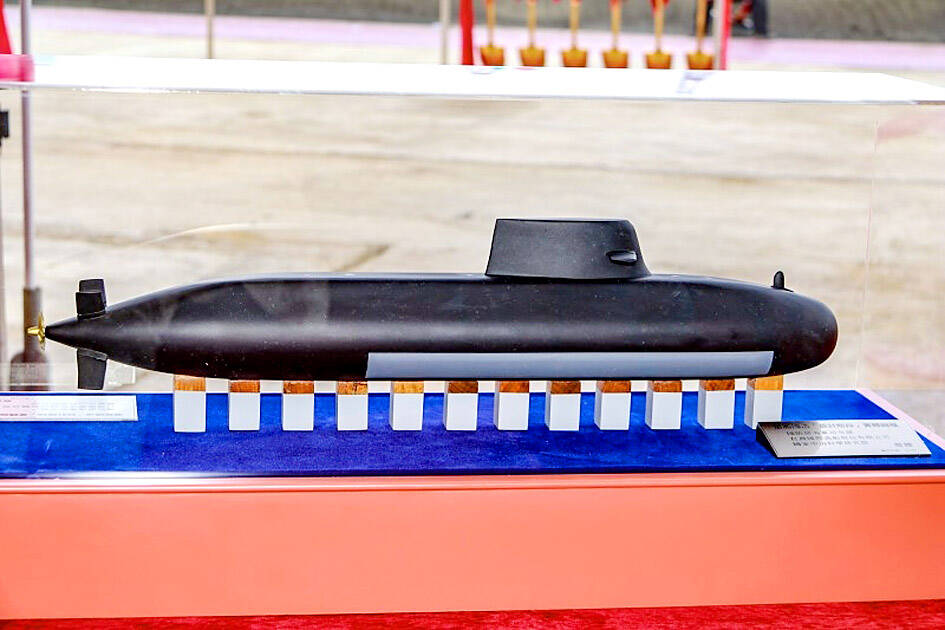A prototype of Taiwan’s first locally built submarine is set to begin testing in September, marking a milestone in the nation’s Indigenous Defense Submarine program, CSBC Corp, Taiwan (台船) chairman Cheng Wen-lon (鄭文隆) said yesterday.
The construction of the prototype has continued around the clock after overcoming a series of difficulties thanks to the cooperation of the Naval Shipbuilding Development Center, the navy’s 256th Submarine Squadron and a CSBC task force, Cheng said.
The government has allocated a NT$49.36 billion (US$1.61 billion) budget over seven years (2019 to 2025) to build a prototype, hoping to launch an indigenous submarine building program that would make Taiwan less dependent on other nations to procure the vessels.

Photo courtesy of the Ministry of National Defense
More than 40 percent of the submarine, including its airtight doors, water conversion system, hydraulic system and silent air-conditioning system, is being manufactured locally, a source familiar with the program said.
Currently, six hull sections have been completed, with only the sail cover section left to be completed, the source said, adding that the ultimate goal is for a submarine cluster to take root in Taiwan so more submarines can be built.
Some “red zone” technologies beyond Taiwan’s submarine design and building capability, such as its diesel engine, torpedo tubes and other combat equipment, have been procured from overseas, the source said.
The Ministry of National Defense has divided the hardware and technologies Taiwan needs for its submarines into red, yellow and green categories, with “red” parts needing to be imported, “yellow” parts that might possibly be made locally and “green” parts that can easily be made in Taiwan.

AIR SUPPORT: The Ministry of National Defense thanked the US for the delivery, adding that it was an indicator of the White House’s commitment to the Taiwan Relations Act Deputy Minister of National Defense Po Horng-huei (柏鴻輝) and Representative to the US Alexander Yui on Friday attended a delivery ceremony for the first of Taiwan’s long-awaited 66 F-16C/D Block 70 jets at a Lockheed Martin Corp factory in Greenville, South Carolina. “We are so proud to be the global home of the F-16 and to support Taiwan’s air defense capabilities,” US Representative William Timmons wrote on X, alongside a photograph of Taiwanese and US officials at the event. The F-16C/D Block 70 jets Taiwan ordered have the same capabilities as aircraft that had been upgraded to F-16Vs. The batch of Lockheed Martin

GRIDLOCK: The National Fire Agency’s Special Search and Rescue team is on standby to travel to the countries to help out with the rescue effort A powerful earthquake rocked Myanmar and neighboring Thailand yesterday, killing at least three people in Bangkok and burying dozens when a high-rise building under construction collapsed. Footage shared on social media from Myanmar’s second-largest city showed widespread destruction, raising fears that many were trapped under the rubble or killed. The magnitude 7.7 earthquake, with an epicenter near Mandalay in Myanmar, struck at midday and was followed by a strong magnitude 6.4 aftershock. The extent of death, injury and destruction — especially in Myanmar, which is embroiled in a civil war and where information is tightly controlled at the best of times —

China's military today said it began joint army, navy and rocket force exercises around Taiwan to "serve as a stern warning and powerful deterrent against Taiwanese independence," calling President William Lai (賴清德) a "parasite." The exercises come after Lai called Beijing a "foreign hostile force" last month. More than 10 Chinese military ships approached close to Taiwan's 24 nautical mile (44.4km) contiguous zone this morning and Taiwan sent its own warships to respond, two senior Taiwanese officials said. Taiwan has not yet detected any live fire by the Chinese military so far, one of the officials said. The drills took place after US Secretary

THUGGISH BEHAVIOR: Encouraging people to report independence supporters is another intimidation tactic that threatens cross-strait peace, the state department said China setting up an online system for reporting “Taiwanese independence” advocates is an “irresponsible and reprehensible” act, a US government spokesperson said on Friday. “China’s call for private individuals to report on alleged ‘persecution or suppression’ by supposed ‘Taiwan independence henchmen and accomplices’ is irresponsible and reprehensible,” an unnamed US Department of State spokesperson told the Central News Agency in an e-mail. The move is part of Beijing’s “intimidation campaign” against Taiwan and its supporters, and is “threatening free speech around the world, destabilizing the Indo-Pacific region, and deliberately eroding the cross-strait status quo,” the spokesperson said. The Chinese Communist Party’s “threats